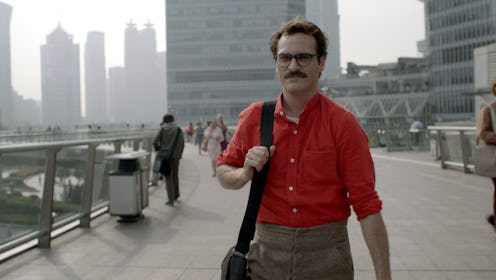
"You're dating a computer?" At the center of the film Her sits this very question. Directed by Spike Jonze and starring Joaquin Phoenix and Scarlett Johansson, the film explores the solitary life of a introverted divorcee, Theodore, who falls in love with his computer operating system, named Samantha, which is voiced by Johansson. The operating system is designed to adapt and evolve along with Theodore, which inevitably causes her to react much like a human and for the two to develop a relationship.
At first glance, the film may seem like fiction — or even plain madness. Is this guy for real? He really and truly thinks he's falling in love with a piece of software? However, when you begin to observe the film's overarching concepts, you may notice that the concept is not as far-fetched as it may initially seem. Here are four reasons why:
1. We talk to computers all day.
What did you do as soon as you woke up this morning? Checked your phone. Texted your friend about dinner plans. Instagrammed a photo of the weather. You probably checked your phone five seconds ago. Probably Snapchatted, too. It is a fact that we as a society have become completely attached and dependent upon our smart phones and our computers to sustain us throughout the day and interact with one another. In addition, we are forced to interact with computers beyond our personal electronics. Need cash? Go to the ATM. Buying something at CVS? Go to the personal check-out. Parking your car in a garage? Pay the machine. Theodore talks to a computer all day. How are we any different?
2. We find romance through technoloy.
When was the last time you met someone organically at a bar that you subsequently went on a date with? We bow depend on apps like Tindr and dating websites to help us meet people and develop romantic relationships. It's totally normal because everyone does it. A lot of people don't even ever physically meet the person they find online. Through chat options, people can talk solely online without ever actually meeting each other. While users feel like they are engaged in some kind of relationship with another person because they are talking to them and getting a response, essentially, they are still just talking to their phone and computer screens. No one else is in the room but them.
3. The Internet knows everything about us.
As data-mining quickly becomes the most useful tool in the world to track individuals and market to them through all facets of their life, computers end up knowing more about us than we even know ourselves. The classic example of this modern phenomenon is that of Target, which determined that a young girl was pregnant based on data about her purchasing behavior before her father even knew. Every site we visit, every item we buy, every move we make is virtually recorded and composes our data makeup. Just like Samantha can adapt to Theodore's emotional and physical wants and needs, so can our very own computers.
4. We drive our own isolation.
We only spend a little over a half hour socializing in person per day, according to Business Insider. The rest of the day is left for virtual activity, which often leaves us physically isolated from the world. Think about it. Whenever you're doing something with your electronics, you fall out of the world around you. Often, you zone out of conversations you were engaged in with friends, co-workers, or family members the second you feel your phone buzz in your pocket. Through social media and online social networks, we feel engaged in other people's lives because we see their personal photos, we're updated with what they're doing, we read statuses about how they're feeling, and we can even message them and get a response instantly. Inevitably, though, we are still just sitting in a room all by ourselves, just like Theodore.
Her is in theaters now.
Images: Warner Bros.